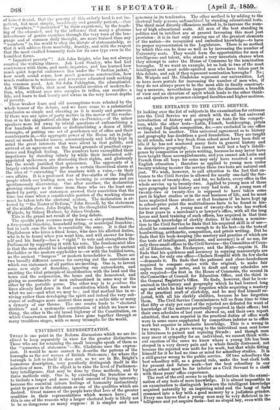UNIVERSITY REPRESENTATION.
THERE is one point in the Reform discussions which we are in- clined to keep separately in view for the greater distinctness. Those who are for retaining the small boroughs speak of them as the "nurseries of statesmen "—Mr. Gladstone uses the expres- sion. It would be more correct to describe the patrons of the boroughs as the wet nurses of British Statesmen ; for where the borough is left to itself it does not, as we see in Mr. Bright's humorous description, very peculiarly distinguish itself in the selection of men. If the object is to raise the level of Parliamen- tary intelligence, that may be done by three methods, and by three methods only. One is, by extending the franchise so as to include a larger and more varied amount of living interests ; because the essential inborn feelings of humanity instinctively point to power in the statesman as one of the qualities which are desired. Great masses of the people have that love of the greater qualities in their representatives which women have ; and this is one of the reasons why a larger electoral body is likely not to be so dangerous as many suppose : it is simpler and more
generous in its tendencies. The other method is by adding to the electoral body persons enfranchised by standing educational tests. The third most directly efficacious method is, to increase the num- ber of high educational seats. All men of the best standing in politics and in intellect are at present favouring this most just provision : it is in fact only causing one of the greatest elements of the nation—its recognized and embodied knowledge—to have its proper representation in the Legislature. There is no method by which this can be done so well as by increasing the number of University seats. They would form the opportunities for men of intelligence and talent, who stand a very uncertain chance when they attempt to enter the House of Commons by the nomination boroughs. If we want an example, let us look to two of the most intelligent and most noble-spirited men who have taken part in this debate, and ask if they represent nomination boroughs ? No; Mr. Walpole and Mr. Gladstone represent our universities. Let us have more portals for increasing the number of men who, if they do not always prove to be the most able in finally construct- ing a measure, nevertheless import into the discussion a breadth of view and an elevation of spirit which lends to the other think- ers and speakers in presence enlarged faculties and higher motives.


























 Previous page
Previous page